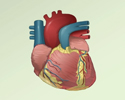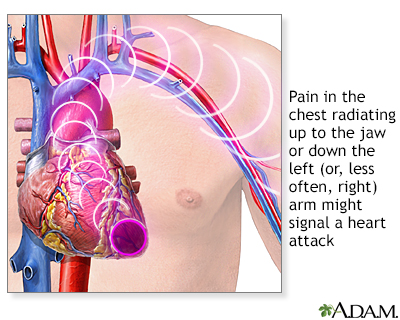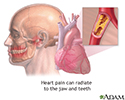Chest pain
Chest tightness; Chest pressure; Chest discomfortChest pain is discomfort or pain that you feel anywhere along the front of your body between your neck and upper abdomen.
Considerations
Many people with chest pain fear that they are having a heart attack (myocardial infarction). However, there are many possible causes of chest pain. Some causes are not dangerous to your health, while other causes are serious and, in some cases, life threatening.
Heart attack
Most heart attacks are caused by a blood clot that blocks one of the coronary arteries. The coronary arteries bring blood and oxygen to the heart. ...

Any organ or tissue in your chest can be the source of pain, including your heart, lungs, esophagus, muscles, ribs, tendons, or nerves. Pain may also spread to the chest from the neck, abdomen, and back and may be due to problems in any of those areas.
Causes
Heart or blood vessel problems that can cause chest pain:
-
Angina or a heart attack. The most common symptom is chest pain that may feel like tightness, heavy pressure, squeezing, or crushing pain. The pain may spread to the arm, shoulder, jaw, or back.
Angina
Angina is a type of chest discomfort or pain due to poor blood flow through the blood vessels (coronary arteries) of the heart muscle (myocardium). ...
 ImageRead Article Now Book Mark Article
ImageRead Article Now Book Mark Article - A tear in the wall of the aorta, the large blood vessel that takes blood from the heart to the rest of the body (aortic dissection) causes sudden, severe pain in the chest and upper back.
Aortic dissection
Aortic dissection is a serious condition in which there is a tear in the wall of the major artery carrying blood out of the heart (aorta). As the te...
 ImageRead Article Now Book Mark Article
ImageRead Article Now Book Mark Article - Swelling (inflammation) in the sac that surrounds the heart (pericarditis) causes pain in the center part of the chest.
Pericarditis
Pericarditis is a condition in which the sac-like covering around the heart (pericardium) becomes inflamed.
 ImageRead Article Now Book Mark Article
ImageRead Article Now Book Mark Article
Lung problems that can cause chest pain:
- A blood clot in the lung (pulmonary embolism).
Pulmonary embolism
A pulmonary embolus is a blockage of an artery in the lungs. The most common cause of the blockage is a blood clot.
 ImageRead Article Now Book Mark Article
ImageRead Article Now Book Mark Article - Collapse of the lung (pneumothorax).
Pneumothorax
A collapsed lung occurs when air escapes from the lung. The air then fills the space outside of the lung between the lung and chest wall. This buil...
 ImageRead Article Now Book Mark Article
ImageRead Article Now Book Mark Article -
Pneumonia may cause a sharp chest pain that often gets worse when you take a deep breath or cough.
Pneumonia
Pneumonia is inflamed or swollen lung tissue due to infection with a germ. This article covers community-acquired pneumonia (CAP). This type of pneu...
 ImageRead Article Now Book Mark Article
ImageRead Article Now Book Mark Article - Swelling of the lining around the lung (pleurisy) can cause chest pain that usually feels sharp, and often gets worse when you take a deep breath or cough.
Pleurisy
Pleurisy is an inflammation of the lining of the lungs and chest (the pleura) that leads to chest pain when you take a breath or cough.
 ImageRead Article Now Book Mark Article
ImageRead Article Now Book Mark Article
Other causes of chest pain:
-
Panic attack, which often occurs with fast breathing.
Panic attack
Panic disorder is a type of anxiety disorder in which you have repeated attacks of intense fear that something bad will happen.
Read Article Now Book Mark Article - Inflammation where the ribs join the breast bone or sternum (costochondritis).
Costochondritis
All but your lowest 2 ribs are connected to your breastbone by cartilage. This cartilage can become inflamed and cause pain. This condition is call...
 ImageRead Article Now Book Mark Article
ImageRead Article Now Book Mark Article -
Shingles, which causes sharp, tingling pain on one side that stretches from the chest to the back, and may cause a rash.
Shingles
Shingles is a painful, blistering skin rash. It is caused by the varicella-zoster virus, a member of the herpes family of viruses. This is the viru...
 ImageRead Article Now Book Mark Article
ImageRead Article Now Book Mark Article - Strain of the muscles and tendons between the ribs.
Chest pain can also be due to the following digestive system problems:
- Spasms or narrowing of the esophagus (the tube that carries food from the mouth to the stomach)
-
Gallstones cause pain that gets worse after a meal (most often a fatty meal).
Gallstones
Gallstones are hard deposits that form inside the gallbladder. These may be as small as a grain of sand or as large as a golf ball.
 ImageRead Article Now Book Mark Article
ImageRead Article Now Book Mark Article - Heartburn or gastroesophageal reflux (GERD)
Gastroesophageal reflux
Gastroesophageal reflux disease (GERD) is a condition in which the stomach contents leak backward from the stomach into the esophagus (food pipe). F...
 ImageRead Article Now Book Mark Article
ImageRead Article Now Book Mark Article -
Stomach ulcer or gastritis: Burning pain occurs if your stomach is empty and feels better when you eat food
Stomach ulcer
A peptic ulcer is an open sore or raw area in the lining of the stomach or intestine. There are two types of peptic ulcers:Gastric ulcer -- occurs in...
 ImageRead Article Now Book Mark Article
ImageRead Article Now Book Mark Article
In children, most chest pain is not caused by the heart.
Home Care
For most causes of chest pain, it is best to check with your health care provider before treating yourself at home.
When to Contact a Medical Professional
Call 911 or the local emergency number if:
- You have sudden crushing, squeezing, tightening, or pressure in your chest.
- Pain spreads (radiates) to your jaw, left arm, or between your shoulder blades.
- You have nausea, dizziness, sweating, a racing heart, or shortness of breath.
- You know you have angina and your chest discomfort is suddenly more intense, brought on by lighter activity, or lasts longer than usual.
- Your angina symptoms occur while you are at rest.
- You have sudden, sharp chest pain with shortness of breath, especially after a long trip, a stretch of bedrest (for example, following an operation), or other lack of movement, especially if one leg is swollen or more swollen than the other (this could be a blood clot, part of which has moved to the lungs).
- You have been diagnosed with a serious condition, such as heart attack or pulmonary embolism.
Heart attack symptoms
Symptoms of a possible heart attack include chest pain and pain that radiates down the shoulder and arm. Some people (older adults, people with diabetes, and women) may have little or no chest pain. Or, they may experience unusual symptoms (shortness of breath, fatigue, weakness). Women are more likely than men to have symptoms of nausea, vomiting, back or jaw pain, and shortness of breath with chest pain.
Your risk of having a heart attack is greater if:
- You have a family history of heart disease.
Heart disease
Coronary heart disease is a narrowing of the blood vessels that supply blood and oxygen to the heart. Coronary heart disease (CHD) is also called co...
 ImageRead Article Now Book Mark Article
ImageRead Article Now Book Mark Article - You smoke, use cocaine, or are overweight.
- You have high cholesterol, high blood pressure, or diabetes.
High cholesterol
Cholesterol is a fat (also called a lipid) that your body needs to work properly. Too much bad cholesterol in your blood can increase your chance of...
 ImageRead Article Now Book Mark Article
ImageRead Article Now Book Mark ArticleHigh blood pressure
Blood pressure is a measurement of the force exerted against the walls of your arteries as your heart pumps blood to your body. Hypertension is the ...
 ImageRead Article Now Book Mark Article
ImageRead Article Now Book Mark ArticleDiabetes
Diabetes is a long-term (chronic) disease in which the body cannot regulate the amount of sugar in the blood.
 ImageRead Article Now Book Mark Article
ImageRead Article Now Book Mark Article - You already have heart disease.
Contact your provider if:
- You have a fever or a cough that produces yellow-green phlegm.
- You have chest pain that is severe and does not go away.
- You are having problems swallowing.
- Chest pain lasts longer than 3 to 5 days.
What to Expect at Your Office Visit
Your provider may ask questions such as:
- Is the pain between the shoulder blades? Under the breast bone? Does the pain change location? Is it on one side only?
- How would you describe the pain? (severe, tearing or ripping, sharp, stabbing, burning, squeezing, tight, pressure-like, crushing, aching, dull, heavy)
- Does it begin suddenly? Does the pain occur at the same time each day?
- Does the pain get better or worse when you walk or change positions?
- Can you make the pain happen by pressing on a part of your chest?
- Is the pain getting worse? How long does the pain last?
- Does the pain go from your chest into your shoulder, arm, neck, jaw, or back?
- Is the pain worse when you are breathing deeply, coughing, eating, or bending?
- Is the pain worse when you are exercising? Is it better after you rest? Does it go away completely, or is there just less pain?
- Is the pain better after you take nitroglycerin medicine? After you eat or take antacids? After you belch?
- What other symptoms do you have?
The types of tests that are done depend on the cause of the pain, and what other medical problems or risk factors you have.
References
Bonaca MP, Sabatine MS. Approach to the patient with chest pain. In: Libby P, Bonow RO, Mann DL, Tomaselli GF, Bhatt DL, Solomon SD, eds. Braunwald's Heart Disease: A Textbook of Cardiovascular Medicine. 12th ed. Philadelphia, PA: Elsevier; 2022:chap 35.
Brown JE. Chest pain. In: Walls RM, Hockberger RS, Gausche-Hill M, eds. Rosen's Emergency Medicine: Concepts and Clinical Practice. 10th ed. Philadelphia, PA: Elsevier; 2023:chap 22.
Goldman L. Approach to the patient with possible cardiovascular disease. In: Goldman L, Cooney KA, eds. Goldman-Cecil Medicine. 27th ed. Philadelphia, PA: Elsevier; 2024:chap 39.
Gulati M, Levy PD, Mukherjee D, et al. 2021 AHA/ACC/ASE/CHEST/SAEM/SCCT/SCMR guideline for the evaluation and diagnosis of chest pain: a report of the American College of Cardiology/American Heart Association Joint Committee on Clinical Practice Guidelines. J Am Coll Cardiol. 2021;78(22):e187-e285. PMID: 34756653 pubmed.ncbi.nlm.nih.gov/34756653/.
Writing Committee Members; Virani SS, Newby LK, et al. 2023 AHA/ACC/ACCP/ASPC/NLA/PCNA Guideline for the Management of Patients With Chronic Coronary Disease: A Report of the American Heart Association/American College of Cardiology Joint Committee on Clinical Practice Guidelines. J Am Coll Cardiol. 2023;82(9):833–955. PMID: 37480922 pubmed.ncbi.nlm.nih.gov/37480922/.
-
Chest pain
Animation
-
Heart attack symptoms - illustration
Symptoms of a possible heart attack include chest pain and pain that radiates down the shoulder and arm. Some people (older adults, people with diabetes, and women) may have little or no chest pain. Or, they may experience unusual symptoms (shortness of breath, fatigue, weakness). Women are more likely than men to have symptoms of nausea, vomiting, back or jaw pain, and shortness of breath with chest pain.
Heart attack symptoms
illustration
-
Jaw pain and heart attacks - illustration
Pain from a heart attack may sometimes radiate to the jaw and teeth. Chest pain is a major symptom of heart attack, but other symptoms such as weakness, shortness of breath, nausea, or vomiting may also occur.
Jaw pain and heart attacks
illustration
-
Heart attack symptoms - illustration
Symptoms of a possible heart attack include chest pain and pain that radiates down the shoulder and arm. Some people (older adults, people with diabetes, and women) may have little or no chest pain. Or, they may experience unusual symptoms (shortness of breath, fatigue, weakness). Women are more likely than men to have symptoms of nausea, vomiting, back or jaw pain, and shortness of breath with chest pain.
Heart attack symptoms
illustration
-
Jaw pain and heart attacks - illustration
Pain from a heart attack may sometimes radiate to the jaw and teeth. Chest pain is a major symptom of heart attack, but other symptoms such as weakness, shortness of breath, nausea, or vomiting may also occur.
Jaw pain and heart attacks
illustration
Review Date: 5/8/2024
Reviewed By: Thomas S. Metkus, MD, Assistant Professor of Medicine and Surgery, Johns Hopkins University School of Medicine, Baltimore, MD. Also reviewed by David C. Dugdale, MD, Medical Director, Brenda Conaway, Editorial Director, and the A.D.A.M. Editorial team.






